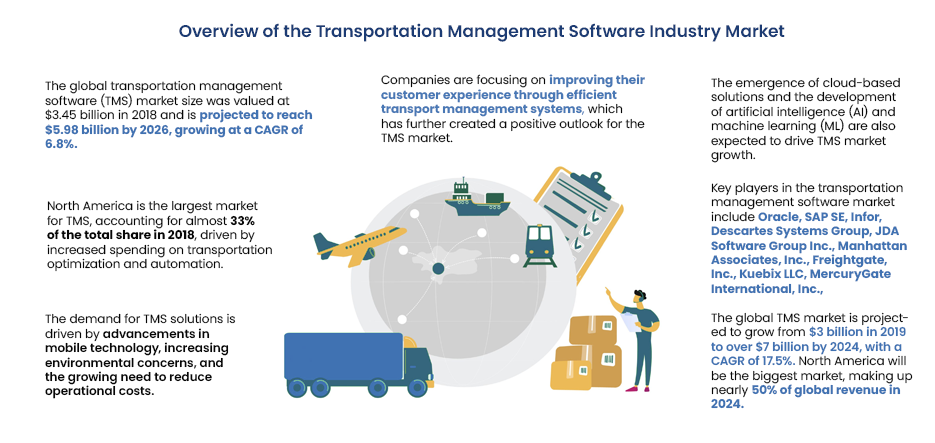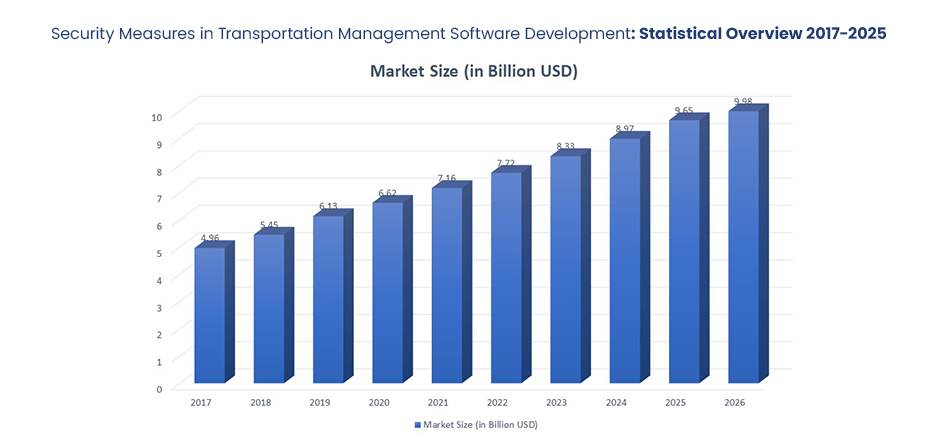Table of Contents
Since then, several transportation management software programs have come online, and the transport industry has dramatically improved. Currently, transportation management software (TMS) is an indispensable factor that enables companies to remain up-to-date, increase productivity, and minimize expenses for digital transformation companies in USA. TMS will become increasingly essential by 2025 when the worldwide desire for logistic services expands. A recent study by Forbes shows that the world’s TMS market in 2025 will be worth USD 14.2 billion at a CAGR of 7.4 %. As a result, the market has expanded and increasingly demanded more advanced programs tailored to maximizing supply chain efficiency while satisfying customers’ needs for on-time delivery.
This is the ultimate guide that will shed some light on the current transportation management system software market and further explain how future trends in technology may change the development roadmap of TMS in 2025.
2025 will concentrate more on developing mobile-compatible, user-friendly, and cloudable software. Gartner states that the coming generation of TMS solutions will depend on predictive analytics and artificial intelligence to assist the custom software development services, optimize shipping processes, and raise customer service.
On another note, the Harvard Business Review suggests that the TMS software will bring together the various distribution chain stakeholders to develop a superior solution. Lastly, Oxford Economics predicts that by 2025, automating processes such as invoicing and container tracking will be capable of providing real-time views on shipping data, allowing a reduction in logistics software development costs in the USA.
Looking for a Tech Upgrade? Let’s Build Your Next Software Solution Together!
Introduction to Transportation Management Software
Transportation management software (TMS) are program designed to make it easier for companies to run their transportation operations. The cloud-based system enhances operational efficiency, reducing transport costs and increasing visibility of end-to-end transport processes. Forbes states that different companies in the field, including retail, health care, and manufacturing, are adopting this software. Technology has been used to develop the Transportation Management System and expand its implementation to enhance microservices architectures.
Transportation software development helps businesses simplify their processes in order processing, shipping, and inventory planning. This also assists firms in cutting down on their operating expenses. Besides, it gives an insightful view of the transport process, improving customer operations. For instance, Harvard Business Review indicated that firms utilizing TMS tend to experience a 10% to 20% enhancement of operability and lower expenses.
Best transportation management software systems usually encompass automated functions, simplify processes, and allow for the viewing of reports. Businesses must adopt a good TMS to cut costs, improve efficiency, and provide excellent customer service. It is an integrated software solution for tracking, managing, and analyzing every aspect of transport. Businesses operating within various sectors, such as automotive, retail, logistics, manufacturing, and e-commerce, utilize TMS systems.

What is The Importance of Transportation Management Software Development?
A robust system with transport management software is now the best tool and a crucial element in the transport sector. Such applications assist enterprises in controlling fleet operations, selecting optimal routes, and monitoring shipments. Transportation management system software also simplifies the planning and management of such services as invoicing, order tracking, and route optimization.
The Importance of Transportation Management Software Development:
1. Improved Efficiency
Custom software development services can optimize operations using TMS to manage invoicing, order tracking, and shipping route optimization. This also enhances quickness as many manual procedures are cut down, hence making fewer mistakes.
2. Cost Savings
Using TMS helps companies reduce expenditure through efficient routing and enhanced utilization of resources. It can also assist companies in cutting back on operational costs like manual procedures and general transport costs.
3. Increased Visibility
Businesses can have direct insight into their shipments in real-time with the aid of transportation management software (TMS). They can track their shipment status and curtail unnecessary delays in deliveries.
4. Better Customer Service
This way, the TMS can improve customer service by giving real-time data about the order to the customer. The transportation software development approach assists in the fast resolution of problems as well as the satisfaction of customers with the service they receive.
5. Scalability
TMS adapts to various business requirements, scaling up with a company’s expansion. In this way, it enables organizations to maintain the efficiency and effectiveness of their transport operations as the firms expand.
6. Improved Security
When ensuring your shipment is secure or adheres to the required legislation, TMS can significantly help a company. It will further enable logistics software development in the USA to monitor their shipment operations, providing quick solutions in case of problems incurred along these lines.
7. Enhanced Reporting
Businesses can use the best transportation management software to generate specific analytics and report on complex transport operations, making it easy to view what is happening in their business. The company can provide better decision-making and develop good transport strategies.
What are The Essential Features of Transportation Management Software?
Logistics and supply chain management cannot do without TMS. This offers a robust set of tools that enable enterprise software development companies to follow up on orders, cut down delivery expenses, serve customers better, and much more. This article will examine the critical components of the TMS systems and how these solutions could ease businesses’ workflow.
Essential Features of Transportation Management Software:
1. Order Tracking
Through TMS, companies can follow up on orders at all times, promptly identifying disruptions. It ensures that customers get their shipments on time and facilitates management to provide quick solutions in case of any problem.
2. Route Optimization
Companies need to analyze different parameters like traffic and fuel cost, which agile methodology in software development can do for them. This is where businesses save time and money through lowered transportation costs.
3. Fleet Management
Companies can use TMS to track vehicle usage and ensure they meet their maintenance schedule. Such moves can enable digital transformation companies in USA to maintain their fleet well, thereby minimizing disruptions and breakdowns.
4. Customer Service
Businesses that use TMS can get reports detailing how they understand the needs of their customers. By doing this, companies can promptly address potential customer challenges and enhance consumer satisfaction.
5. Document Management
TMS can also handle all documents, such as invoices, order forms, shipping labels, and compliance documents. This assists businesses in maintaining records correctly and timely.
6. Security
TMS helps companies avoid cargo loss in transit through features like real-time alarm notifications and GPS tracking. Through this, companies can be assured of the security and compliance of their shipments with set requirements.
Empower Your Business with Cutting-Edge Software. Request a Free Consultation Today!
What are The Key Factors for Choosing the Right Transportation Management Software in 2025?
With every passing day, technology is making it easier for companies to track their freight shipment as we move toward future transportation and logistics. Here are some key factors to consider when selecting a transportation management software (TMS):
- Automation is the most popular of all the features in modern TMS solutions. It allows for ease of doing custom software development services as it improves the efficiency of business processes. Companies may save time and money by automatically tracking orders and optimizing routes.
- It should be scalable to enable effective management of shipping processes in large companies. A flexible system should be able to expand and adapt to changing business requirements without being too expensive or bulky.
- Businesses should also ensure that the system they have in place is easily integrated with other functional tools This will allow the system to offer one solution for every operation.
- The company should choose a reliable TMS, especially if their business involves sensitive data or highly guarded goods to be transported. Data security, as well as protection against any tampering, should be highly advanced on this system.
- Finally, but most importantly, the cost of a TMS must also be considered. Digital transformation services must ensure that they are not overpaying for their required needs and provide a good return on investment.
How does Transportation Management Software Positively Influence the Efficiency of Logistics Operations?
TMS is an effective software that assists in enhancing the efficiency of logistic activities. For instance, TMS can improve operational efficiency by decreasing lead times and increasing the efficiency with which information is communicated between various players in the supply chain.
For example, implementing TMS improves logistics effectiveness by offering instant shipment updates. This also provides ease of tracking down shipments and quick time to resolve any issues that may arise. Additionally, outsourcing software companies provide comprehensive analytics, which enables business entities to make appropriate decisions regarding their Supply Chain.
Besides, TMS plays a vital role in the automation of logistics processes. Subsection: Companies can eliminate many other time-consuming actions they conduct manually through a TMS solution. It enables digital transformation companies in USA to concentrate on other strategic activities that make an organization efficient.
Similarly, TMS enables companies to enhance communication in their supply chain. Lastly, through TMS, all stakeholders receive alerts on any updates or changes done within the organization to maintain smooth operations.
How are The Latest Technology Advancements Shaping the Landscape of Transportation Management Software?
Almost all areas of our lives have been influenced by rapidly growing technology, including the transport management system. Recent technological developments have made transportation management software (TMS) more effective and economical compared to previous times. Moreover, in the following paragraphs, we shall look at how recent technological innovations are changing the dynamics of TMS.
1. Artificial Intelligence (AI)
Artificial intelligence in software development offers intelligent analytics for logistics operations that enable firms to anticipate change and act quickly. In addition, AI can facilitate self-healing networks that provide instantaneous alerts of problems or delays to enable route optimization and billing process automation.
2. Cloud Computing
Migrating to the cloud reduces costs while offering good scalability and analytical possibilities. However, multiple users from different geographical areas will be able to collaborate simultaneously, thus leading to enhanced coordination and reduced hustles.
3. Data Analytics
The development of BMTS solutions allows the use of big data analytics for precise prediction and better decisions on large scales. This may assist enterprise software development companies in enhancing their supply chain operations and customer experience.
4. Data Mining Using Machine Learning Algorithms
This technique utilizes vast volumes of data to carry out various processes that were done manually in the past by human labor. Artificial intelligence in software development benefits most companies because it can also cut costs, increase accuracy, and enhance efficiencies across domains like fleet management and delivery logistics, among others.
5. Internet of Things
IoT-enabled products can generate information about the flow of goods within a warehouse, which helps a company organize organizations better. Also, this may assist businesses in cutting costs while enhancing the customers’ experience.
6. Transportation and Logistics
Autonomous vehicles are under development for transport and logistics operations, using fewer human laborers. This is a step towards lowering costs, enhancing safety, and improving efficiency, thereby making the processes more precise.
Predicting occurrences before they occur also contributes to the increasing popularity of predictive maintenance in Transport Management Systems (TMS) solutions, which reduces waste of time and enhances performance.
7. Transportation
Blockchain technology holds prospects for transforming transport and logistic operations with higher safety, visibility, and traceability across supply chains. Transportation software development could enable companies to cut expenditures while improving output.
8. Mixed Reality
Mixed reality is applied to intensify driver and dispatch training without needing to go into a road or warehouse. However, this may assist in lowering expenses while enhancing the level of security.
Innovate, Automate, and Excel with A3logics Custom Software Development Services
Importance of Security Measures in Transportation Management Software Development
Security is a critical element in transport management software development. Due to the rising cyber threat, development teams ought to ensure that the products they create are safe and stable. These software systems enable transport firms to receive live updates, which are usually precise regarding the shipping and delivery activities.
To ensure the safety of their data and customers, transportation companies should consider employing the following security measures:
1. Encryption
Sensitive data such as passwords, payment information, and personnel sensitive information must always be encrypted when using transportation management software to prevent a third party’s access.
2. Access Control
These are known as access control systems, which enable one to determine who has access to the software and how much access they will get for their role in the company. This is an effective way to keep unwanted people from looking into and altering restricted information.
3. Firewall Protection
Firewalls protect the system from malicious attacks from the outside world and various viruses.
4. Multi-Factor Authentication
Multi-factor authentication (this is provided to make it hard for the offenders to access the system).
5. Software Updates
Regular software updates are needed to ensure the patches for the security flaws are timely and that the software is updated in terms of present-day security standards.
6. Physical Security Measures
Physical security measures such as access control systems, CCTV cameras, and alarms can help protect the premises from intruders.
7. Disaster Recovery Plan
In addition, agile methodology in software development would be essential to provide a disaster recovery plan so that the data stolen or lost for any reason could be recovered as fast as possible.
8. Penetration Testing
Penetration testing refers to attempting to access a system to discover security weaknesses. This will help identify and address vulnerabilities before they are found and exploited.
9. Data Protection
Businesses must implement the best practices in data security to ensure that confidential information is not stolen or lost. This means using secure backup systems and data encryption and providing employees with their obligations when dealing with customer data.
10. Network Security
Businesses should also consider security measures like firewalls, VPNs, and intrusion. They should use secure networks to ensure that only approved devices and users can connect to the network. The best transportation management software uses tools like firewalls or antivirus software, such as two-factor authentication. Personnel can gain access to the system.

How to Select the Best IT Service Provider for Transportation Management Software Development
Selecting the ideal IT service provider for software development in transportation development is crucial to ensure your venture succeeds. The best provider will be able to provide the required services and should be knowledgeable about the most recent technology and developments. Here are a few suggestions to help you choose the ideal IT service provider for your transportation software development:
1. Research
Before making your decision, you should thoroughly research the various service providers available. Check their experience, services, and customer reviews to ensure that you select the ideal service for your needs.
2. Experience
Be sure to look up custom software development for startups experienced in delivering successful projects. You can ask them to present case studies of projects they’ve completed so you will know their abilities.
3. Communication
Clear communication is essential to the success of software development projects. Ask the developer about their communication protocols and how they deal with any issues that might arise during the project.
4. Cost cost
Cost is always a consideration when choosing the right supplier of IT services. Be sure to check prices among different providers to ensure you’re getting the most for your budget.
5. Security
Security is a must when choosing an IT services provider. Be sure to inquire about their security procedures and how they intend to secure your information from hackers and malicious software.
6. Customer Support
The after-sales support is as crucial as the actual work. Ask the vendor what support they provide for bugs, like updates, fixes, and maintenance.
7. Flexibility
Software development projects frequently change throughout the process of executing the project. Be sure to determine how flexible your provider is in making adjustments or modifications throughout.
If you follow these guidelines, You can be sure to choose the correct IT service supplier for your software to manage transportation development projects.
Transform Your Software Vision into Reality – Book A 30 Minutes Free Consultation!
Conclusion
As software for transportation management is constantly evolving, businesses must be equipped with the appropriate strategies and tools. The ultimate guide on Transportation Management Software Development in 2025 offers a comprehensive review of the most recent technology and innovations that will assist businesses with the right solutions to run their business.
The guide will highlight the significant trends in software for transportation development in the coming four years and offer an extensive outline of the software development process. According to a forecast by Oxford Economics, they anticipate that the world TMS market should reach a figure of $24 billion by 2024. Gartner also forecasts that TMS will be indispensable for organizations to compete through their SCs. It also offers guidelines on choosing the best IT service provider and the most effective methods to manage project teams and maintain quality assurance.
By following these rules, companies can be sure they have the right tools and strategies to offer efficient transportation management solutions by 2025 and beyond.
Frequently Asked Questions
1. What’s the goal of Transportation Management Software Development in 2025?
Transportation Management Software Development in 2025 aims to increase the efficiency, accuracy, and effectiveness of transportation services across the globe. It will enable improved delivery schedules and routing optimizationentory management, route opti optimization more.
2. What advantages will this program bring?
The primary benefit of using this software is the increased efficiency. It can help custom software development services simplify their transport processes and speed up delivery time. Furthermore, it can assist in improving routes, reducing fuel use, and enhancing inventory management.
3. What are the most essential characteristics of this program?
Some of the most prominent features include routing opti optimization, real-time tracking, ordering management, driver assessment, and many more.
4. What are the technologies that are utilized in Transportation Management Software Development?
The principal technologies used in software development for transportation management include artificial intelligence, cloud computing, machine learning, machine learning, and Internet of Things (IoT) devices. These technologies enable more efficient scheduling of delivery and opti-optimization routes.
5. How can businesses guarantee high-quality assurance by making use of this software?
Businesses must work with a trusted IT company to ensure that software is adequately tested and kept up-to-date. Quality assurance must be a top consideration when selecting a vendor, and also when designing the program.
6. What are the tips for choosing the most suitable IT supplier?
When choosing the right IT supplier, enterprise software development companies must know the security measures and protocols, after-sales service, and flexibility. It is also essential to look at the company’s history and knowledge in software development.
7. What are the best practices for managing team members on projects?
The best ways to manage project teams include setting realistic deadlines, getting feedback from everyone on the team, and establishing transparent communication channels. Furthermore, it is essential to make sure that everyone on the team is aware of their role and responsibilities.
8. What do the prospects for Transportation Management Software Development look like?
The next phase of Transportation Management Software Development looks promising. With the advancement of technology like cloud computing, artificial intelligence, machine learning, and IoT devices, companies can improve their transport processes and ensure that deliveries are completed efficiently and at a reasonable cost.






